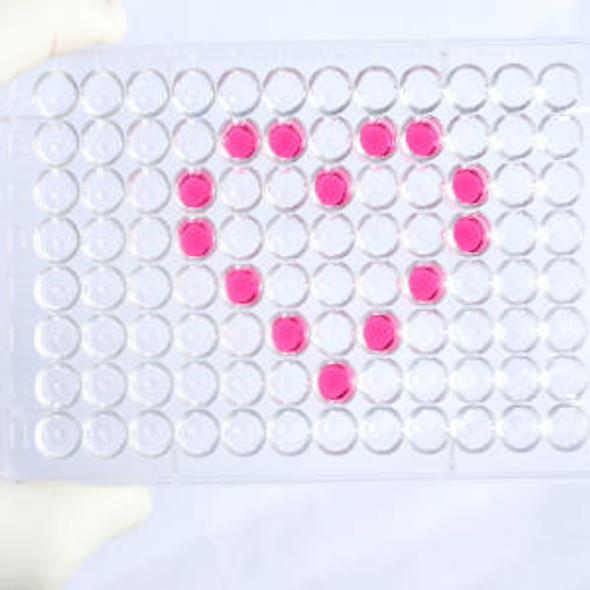Neuroscience
Anti-PMP22 Antibody (CAB15083)
- SKU:
- CAB15083
- Product Type:
- Antibody
- Reactivity:
- Human
- Host Species:
- Rabbit
- Isotype:
- IgG
- Antibody Type:
- Polyclonal Antibody
- Research Area:
- Neuroscience
Description
| Antibody Name: | Anti-PMP22 Antibody |
| Antibody SKU: | CAB15083 |
| Antibody Size: | 20uL, 50uL, 100uL |
| Application: | WB |
| Reactivity: | Human |
| Host Species: | Rabbit |
| Immunogen: | A synthetic peptide corresponding to a sequence within amino acids 50-150 of human PMP22 (NP_000295.1). |
| Application: | WB |
| Recommended Dilution: | WB 1:500 - 1:2000 |
| Reactivity: | Human |
| Positive Samples: |
| Immunogen: | A synthetic peptide corresponding to a sequence within amino acids 50-150 of human PMP22 (NP_000295.1). |
| Purification Method: | Affinity purification |
| Storage Buffer: | Store at -20'C. Avoid freeze / thaw cycles. Buffer: PBS with 0.02% sodium azide, 50% glycerol, pH7.3. |
| Isotype: | IgG |
| Sequence: | VHHC FSSS PNEW LQSV QATM ILSI IFSI LSLF LFFC QLFT LTKG GRFY ITGI FQIL AGLC VMSA AAIY TVRH PEWH LNSD YSYG FAYI LAWV AFPL ALLS G |
| Gene ID: | 5376 |
| Uniprot: | Q01453 |
| Cellular Location: | Cell membrane, Multi-pass membrane protein |
| Calculated MW: | 17kDa |
| Observed MW: | Refer to figures |
| Synonyms: | PMP22, CIDP, CMT1A, CMT1E, DSS, GAS-3, GAS3, HMSNIA, HNPP, Sp110 |
| Background: | This gene encodes an integral membrane protein that is a major component of myelin in the peripheral nervous system. Studies suggest two alternately used promoters drive tissue-specific expression. Various mutations of this gene are causes of Charcot-Marie-Tooth disease Type IA, Dejerine-Sottas syndrome, and hereditary neuropathy with liability to pressure palsies. Alternative splicing results in multiple transcript variants. |
| UniProt Protein Function: | PMP22: Might be involved in growth regulation, and in myelinization in the peripheral nervous system. Defects in PMP22 are the cause of Charcot-Marie-Tooth disease type 1A (CMT1A); also known as hereditary motor and sensory neuropathy IA. CMT1A is a form of Charcot-Marie- Tooth disease, the most common inherited disorder of the peripheral nervous system. Charcot-Marie-Tooth disease is classified in two main groups on the basis of electrophysiologic properties and histopathology: primary peripheral demyelinating neuropathy or CMT1, and primary peripheral axonal neuropathy or CMT2. Neuropathies of the CMT1 group are characterized by severely reduced nerve conduction velocities (less than 38 m/sec), segmental demyelination and remyelination with onion bulb formations on nerve biopsy, slowly progressive distal muscle atrophy and weakness, absent deep tendon reflexes, and hollow feet. CMT1A inheritance is autosomal dominant. Defects in PMP22 are a cause of Dejerine-Sottas syndrome (DSS); also known as Dejerine-Sottas neuropathy (DSN) or hereditary motor and sensory neuropathy III (HMSN3). DSS is a severe degenerating neuropathy of the demyelinating Charcot-Marie- Tooth disease category, with onset by age 2 years. DSS is characterized by motor and sensory neuropathy with very slow nerve conduction velocities, increased cerebrospinal fluid protein concentrations, hypertrophic nerve changes, delayed age of walking as well as areflexia. There are both autosomal dominant and autosomal recessive forms of Dejerine-Sottas syndrome. Defects in PMP22 are a cause of hereditary neuropathy with liability to pressure palsies (HNPP); an autosomal dominant disorder characterized by transient episodes of decreased perception or peripheral nerve palsies after slight traction, compression or minor traumas. Defects in PMP22 are the cause of Charcot-Marie-Tooth disease type 1E (CMT1E); also known as Charcot-Marie- Tooth disease and deafness autosomal dominant. CMT1E is an autosomal dominant form of Charcot-Marie-Tooth disease characterized by the association of sensorineural hearing loss with peripheral demyelinating neuropathy. Defects in PMP22 may be a cause of inflammatory demyelinating polyneuropathy (IDP). IDP is a putative autoimmune disorder presenting in an acute (AIDP) or chronic form (CIDP). The acute form is also known as Guillain-Barre syndrome. Belongs to the PMP-22/EMP/MP20 family. |
| UniProt Protein Details: | Protein type:Membrane protein, multi-pass; Cell adhesion; Cell cycle regulation; Membrane protein, integral Chromosomal Location of Human Ortholog: 17p12 Cellular Component: plasma membrane Molecular Function:protein binding Biological Process: bleb formation; cell death; peripheral nervous system development; synaptic transmission Disease: Charcot-marie-tooth Disease And Deafness; Charcot-marie-tooth Disease, Demyelinating, Type 1a; Guillain-barre Syndrome, Familial; Hypertrophic Neuropathy Of Dejerine-sottas; Neuropathy, Hereditary, With Liability To Pressure Palsies; Roussy-levy Hereditary Areflexic Dystasia |
| NCBI Summary: | This gene encodes an integral membrane protein that is a major component of myelin in the peripheral nervous system. Studies suggest two alternately used promoters drive tissue-specific expression. Various mutations of this gene are causes of Charcot-Marie-Tooth disease Type IA, Dejerine-Sottas syndrome, and hereditary neuropathy with liability to pressure palsies. Alternative splicing results in multiple transcript variants. [provided by RefSeq, Jul 2013] |
| UniProt Code: | Q01453 |
| NCBI GenInfo Identifier: | 266803 |
| NCBI Gene ID: | 5376 |
| NCBI Accession: | Q01453.1 |
| UniProt Secondary Accession: | Q01453,Q8WV01, |
| UniProt Related Accession: | Q01453 |
| Molecular Weight: | 17,891 Da |
| NCBI Full Name: | Peripheral myelin protein 22 |
| NCBI Synonym Full Names: | peripheral myelin protein 22 |
| NCBI Official Symbol: | PMP22 |
| NCBI Official Synonym Symbols: | DSS; GAS3; HNPP; CMT1A; CMT1E; GAS-3; Sp110; HMSNIA |
| NCBI Protein Information: | peripheral myelin protein 22 |
| UniProt Protein Name: | Peripheral myelin protein 22 |
| UniProt Synonym Protein Names: | Growth arrest-specific protein 3; GAS-3 |
| Protein Family: | Peripheral myelin protein |
| UniProt Gene Name: | PMP22 |
| UniProt Entry Name: | PMP22_HUMAN |
View AllClose






